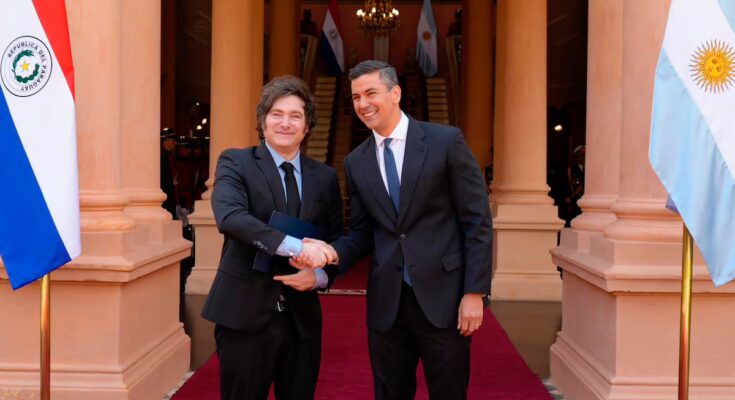Countries gathered at the climate summit in Belém, the Brazilian port city at the mouth of the Amazon, are expected to agree on a 10-year gender equality action plan to integrate women’s experiences in climate action and make climate policy design more inclusive.
In the latest summits organized by the United Nations, it has become clear that climate change exacerbates inequalities and makes the most vulnerable and marginalized people in society also the least able to cope with worsening droughts, floods and storms. Women’s caring responsibilities and their absence from many decision-making processes mean that they are often disproportionately affected by climate impacts.
However, the global backlash against the rights of women and girls and the promotion of a more traditionalist view of society is spilling over into climate negotiations. In this sense, Argentina and Paraguay, which have attacked the rights of women and LGBTQ+ people, have sparked a controversy over the definition of the term “gender”. Before the start of COP30, both countries called for the inclusion of footnotes in the draft plan to clarify their interpretation of gender as referring to the male and female sexes.
Since negotiations began last week, this move has encouraged other religious and socially conservative nations to follow suit. Iran and the Vatican requested footnotes to explain their interpretation of gender as sex. Indonesia and Malaysia also called for the inclusion of footnotes clarifying their positions.
“They want to take us back to the 60s and 70s.”
Lorena Aguilar, executive director of the US-based Kaschak Institute for Social Justice for Women and Girls and former deputy minister of foreign affairs of Costa Rica, told EL PAÍS that the issue has become “explosive” in the negotiations. “This is an unprecedented situation. They want to take us back to the 60s and 70s” and “avoid any recognition of diversity” in the experiences of men and women, she said.
Advocates for women’s rights and gender equality say narrowing the definition of gender will mean a step back from the language used in the United Nations system for three decades. The United Nations climate negotiations have addressed gender issues in negotiations since 2001. These debates aim to take into account the different experiences of men and women in responding to climate change, but have never sought to impose a definition of “gender”. Countries have always interpreted decisions based on national laws and cultural contexts.
“Gender equality is a precondition for effective climate action,” Mary Robinson, a gender equality advocate and former president of Ireland, said in a press conference at COP30 on Wednesday. “When women and gender diverse people are at the table, climate policies are more ambitious, more inclusive and more lasting. The weakening of agreed language undermines climate ambition and is completely new to this (UN climate) system and is not acceptable,” she said.
A large number of countries – including those of the European Union, Canada, Mexico and governments in Latin America, including Panama – opposed the footnotes and the revocation of the previously agreed upon language. However, previous proposals by Norway and Canada to include references to women and girls “in all their diversity” and to “gender diverse” people were removed from the draft text.
Argentina and Paraguay – the latter passed a Senate bill banning gender education – have gone further and questioned the use of the term “gender” in other negotiation tracks, including discussions on how to ensure the transition to a clean energy system is just and equitable within and between countries.
Argentina, where President Javier Milei has dismantled the state apparatus for protecting women from violence and proposed removing femicide from the penal code, has used a gender definition contained in the Rome Statute of the International Criminal Court, an international treaty that establishes the court’s jurisdiction over genocide, crimes against humanity and war crimes. This defines it exclusively as “the two sexes, male and female”.
Fabiana Menna, an Argentine specialist in gender politics, said that returning to the inclusive conception of “gender” as one of the factors that influence people’s vulnerability to climate change would mean “denying the rights of people in all their diversity” and those of LGBTQ+ people, who already suffer discrimination.
Countries must “resist”
Menna, also co-chair of the Women 20 Environment and Climate Change working group, which advises the G20, added that adopting a binary male-female approach will prevent the development of “fairer and more effective policies” that reduce climate vulnerability for all.
Campaigners also fear that the footnotes could set “a dangerous precedent” if retained in the final agreement reached in Belém, as they could open the door for countries to use them to express their position on other issues in the negotiations.
Footnotes clarifying countries’ positions are common in draft texts when issues are negotiated, but are not used in final COP decisions, according to Joanna Depledge, an expert on the UN climate negotiation process and a researcher at the University of Cambridge in the UK. “This is because decisions are made by consensus, and country footnotes contradict that consensus,” he said.
There are other ways that countries can register their interpretation of a specific issue in the UN climate agreements. For example, the preamble of the text could indicate the different interpretations that countries have of the term “gender” depending on national legislation and circumstances.
So, for Bridget Burns, executive director of the Women’s Organization for Environment and Development, which advocates for gender issues in climate negotiations, countries must “stand firm” in the face of pressure to back down on language.


